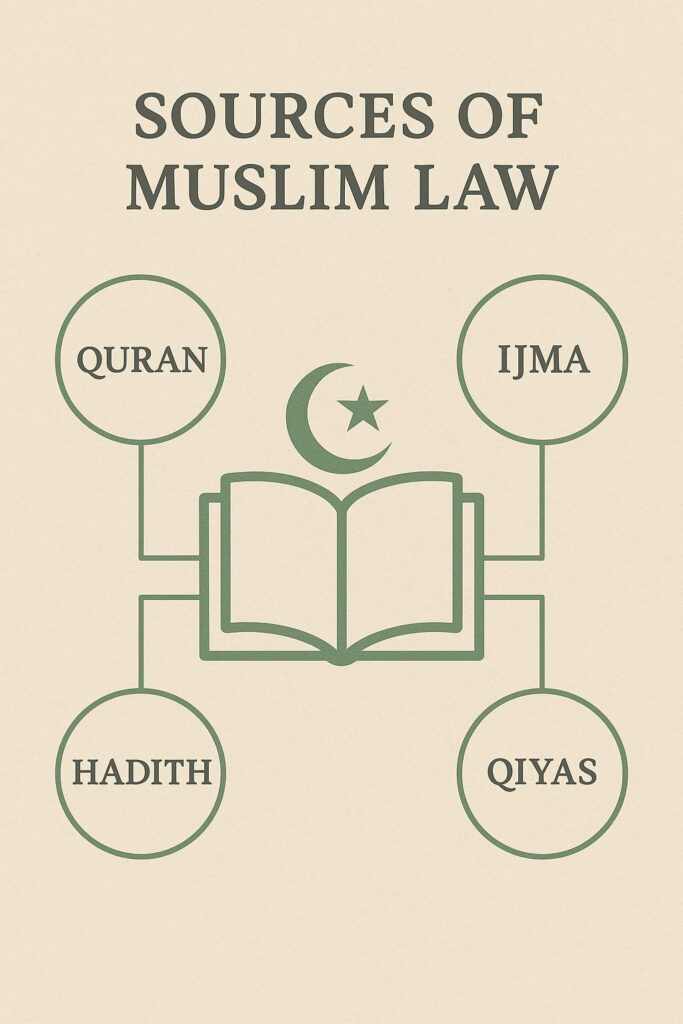Sources of Muslim law
•Introduction to Muslim Law
Muslim Law, also known as Islamic Law or Shariah, is a divine legal system based on the commands of Allah ﷻ and the teachings of Prophet Muhammad ﷺ. Its authority is derived from both revelation and reasoning.The sources of Muslim law are broadly categorized into two types:
•Categories of Sources of Muslim Law
A.Primary Sources of Muslim Law
These are the divine and foundational sources considered authoritative by the Prophet ﷺ himself:
1.Quran – The Word of Allah
• Composed of 114 Surahs and approximately 6237 verses (Ayats).
• Only around 200 verses relate directly to legal matters.
• Deals with issues like inheritance, marriage, punishment, and social reforms.
• Regarded as the first and most important source of Islamic Law.
• Not a complete code, but more like an amending act (Tyabji).
Shayara Bano v. Union of India (2017) 9 SCC 1
• Issue: Constitutionality of Triple Talaq (Talaq-e-Biddat)
• Held: Supreme Court declared instant triple talaq unconstitutional as it has no basis in the Quran and violates fundamental rights.
2. Hadith / Sunnah – Implied Revelation
• Based on the sayings, actions, and approvals of Prophet Muhammad ﷺ.
• Three types of Sunnah:
• Sunnat-ul-Qaul – Sayings
• Sunnat-ul-Fail – Actions
• Sunnat-ul-Taqrir – Silent approvals
• Classified into:
• Mutawatir – Widely accepted
• Mashhoorah – Known but not universal
• Wahid – Narrated by few
Mohd. Ahmed Khan v. Shah Bano Begum (1985) 2 SCC 556
• Issue: Maintenance of a divorced Muslim woman under Section 125 CrPC
• Held: Court interpreted Quranic verses and Hadith to affirm that maintenance is an obligation, even beyond iddat, unless properly settled.
3. Ijma – Consensus of Jurists
• Defined as consensus among qualified Islamic scholars (Mujtahids).
• Types of Ijma:
• Ijma of Companions – Binding and irreversible
• Ijma of Jurists – Based on reasoning
• Ijma of the People – Lesser significance
• Backed by Hadith: “My followers will never agree on something wrong.”
Masroor Ahmed v. State (NCT of Delhi), 2008 (103) DRJ 137
• Issue: Validity of oral talaq without witnesses
• Held: Delhi High Court referred to the Ijma of jurists and classical scholars to say unilateral oral talaq without reasonable cause or attempt at reconciliation is invalid.
4. Qiyas – Analogical Deduction
• Derives law by analogy when Quran, Sunnah, and Ijma don’t apply directly.
• Must not contradict primary sources.
• Supports Islamic adaptability and reasoning.
• Correctives to Qiyas:
• Istihsan – Juristic preference
• Istidlal – Consideration of public good
Daniel Latifi v. Union of India (2001) 7 SCC 740
• Issue: Interpretation of Muslim Women (Protection of Rights on Divorce) Act, 1986
• Held: Applied reasoning (Qiyas) to conclude that the law ensures fair and reasonable provision for a divorced woman, consistent with Quranic values.
B.Secondary Sources of Muslim Law
These are supplementary sources that aid in interpretation and application of the primary texts:
1. Custom (Urf)
• Only accepted if not contradictory to the Quran or Sunnah.
• Abolished in matters like marriage, inheritance, divorce via Shariat Act, 1937.
2. Judicial Precedents
• Decisions from Indian High Courts, Supreme Court, and Privy Council.
• These interpretations shape modern Muslim law in India.
3. Legislation
Some notable acts modifying Muslim Law in India include:
• Shariat Act, 1937
• Dissolution of Muslim Marriages Act, 1939
• Muslim Women (Protection of Rights on Divorce) Act, 1986
• Prohibition of Child Marriage Act, 2006
• Muslim Women (Protection of Rights on Marriage) Act, 2019
4.Justice, Equity, and Good Conscience
• Applied when analogical deduction is insufficient or unjust.
• Promoted by Hanafi School in exceptional cases.
Shia Perspective
Under Shia Law, the primary sources include:
1. Quran
2. Traditions from the Prophet’s family (Ahlul Bayt)
3. Ijma (with specific limits)
They do not accept Qiyas as a valid source of law.
Conclusion
The Sources of Muslim Law represent a rich blend of divine guidance, prophetic tradition, scholarly consensus, and reasoned judgment. Whether for legal professionals, students, or spiritual seekers, understanding these sources is vital for navigating Islamic jurisprudence in a modern world.
Start Your Preparation with TOA
At Theory of Abrogation, we equip you with everything you need:
•Subject-wise expert classes
•Mock test series
•Legal current affairs
•Personalized mentorship for interview preparation
Your law degree is your foundation, but your preparation is what will build your success.
Join Our New Batch Now!
Prepare smart. Prepare with Theory of Abrogation.
Contact Us:
📍 B-109, Commercial
Complex Dr. Mukherjee
Nagar, Delhi-09
📞 +91 9971399324 | +91 8840961324
📧[email protected]
